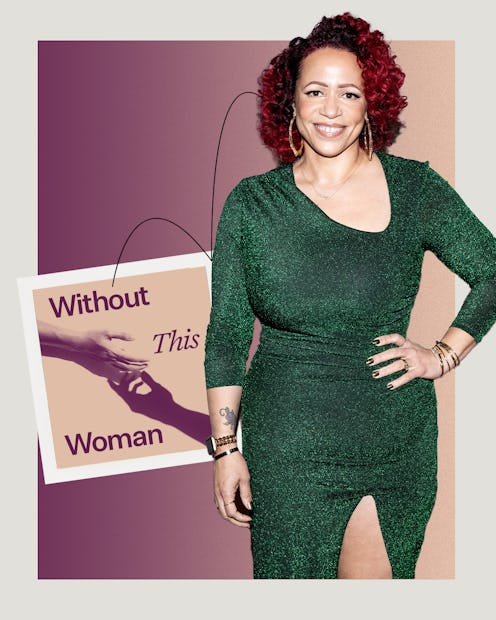Without This Woman
The Woman Nikole Hannah-Jones Credits With Her Career Success
“[She] knows the types of attacks I faced for this work better than almost anyone else,” says the journalist.

Bustle’s Without This Woman is a series of essays honoring the women who change and challenge us every day. Below, Pulitzer Prize-winning journalist Nikole Hannah-Jones talks about her mother, Cheryl Novotny Hannah. Hannah-Jones is celebrating Hulu’s docuseries The 1619 Project, a reimagined version of the same-named special issue of the Times Magazine.
My penchant for the underdog comes from my mom, Cheryl. From a really young age, I became attuned to issues of injustice and inequality after watching her lead by example. She taught me about social justice and fairness, and also that your identities as a woman, as a career woman, and as a full person don’t have to change when you become a parent.
I grew up seeing her work on behalf of powerless people. She was heavily active in her union, fighting for workers who wanted a say, who had been mistreated by management, or who had lost their jobs. If someone needed a place to stay, they would stay with us. To this day, there’s a family friend staying with her because he doesn’t have anywhere else to stay. That’s just what my mom does. She’s one of the most honest and generous people I know.
But growing up, I was always in trouble. I’m an Aries. I’ve always been very independent and averse to authority. I’ve never liked people telling me what to do. I was defiant as a child. I was the kid always asking questions so I was always getting in trouble, mostly for talking back. I wasn’t getting in trouble for big things. I was a great student and loved to read, but I had a very strong sense of autonomy, which parents generally don’t like — and my mom was not a disciplinarian. She didn’t like for us to feel hurt or sad. So if I got my mom mad, I’d really pushed the final button.
“My mom knows the types of attacks I faced for this work better than almost anyone else.”
When I was in high school, I was dating this older guy against my parents’ demands. I got caught sneaking out to see him so I got in a lot of trouble. My mom would ground you, but if you were good for a couple of days, you could usually get out of it. But that time, she stuck to the punishment. For me, the real punishment was her disappointment, because she expected more of me.
She’s always had the utmost confidence in me and in my ability to do whatever I put my mind to. I can count on her to provide me with an ear to listen.
The second episode of the documentary series opens with my mom’s laugh. She has a tremendous sense of humor — she’s like a big kid at heart. She just sent me a picture of her hair; she dyed it blue. She’s got a nose ring. She’s a fun person. She likes to play.
It wasn’t my intent to have so much of my family in The 1619 Project series, but my mom knows the types of attacks I faced for this work better than almost anyone else. She knew I had to be honest; I had to tell the story honestly.
Without this woman, I would not have had the career and impact that I’ve been able to have. Period. I can’t even fathom it. I wish everyone could have grown up with a mom like I have. I hope to have that type of impact on my own child.
As told to Leila Barghouty. This interview has been condensed and edited for clarity.